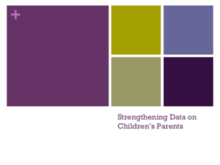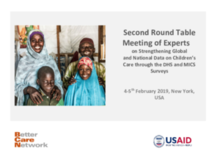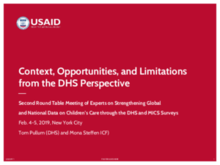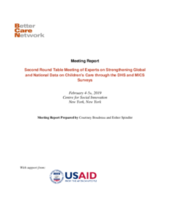With support from USAID, the Better Care Network (BCN) and ICF organized a two-day round table meeting in New York on 4-5 February 2019, to determine how existing population-level surveys could be strengthened to improve global and national data on children’s care and wellbeing.
The two-day meeting was the result of a larger five-year effort to build the evidence base around child wellbeing, care settings, and caregiving patterns and practices. In September 2014, BCN and the Child Protection Monitoring and Evaluation Reference Group (MERG) organized a first Round Table Meeting of Experts to discuss better mining of data related to children’s care that are collected by The Demographic and Health Surveys Program (DHS) and the Multiple Indicators Cluster Surveys (MICS). The group discussed and concurred that better mining of existing data sets, together with inter-agency guidance on how to do this, would support better understanding and use of critical care related data available through these household surveys. The participants also agreed that a review was needed of the DHS and MICS questionnaires and other national and international surveys relevant to family composition, functioning, processes and care patterns to explore ways in which population level data on children’s care arrangements and their relationship to child well-being outcomes could be strengthened (a full report of the first round table can be found here).
Following the 2014 round table, a white paper was commissioned by BCN and ICF, amassing research evidence related to child wellbeing and caregiving. Variables correlated with child wellbeing were identified in the domains of family structure, family socioeconomics, and family processes, in addition to factors that contribute to separation of children from their families. Subsequently, DHS and MICS questionnaires and modules were reviewed to determine whether and/or how variables identified through the review could be included in the DHS and MICS questionnaires. The final paper outlined specific recommendations for revisions to DHS and MICS questionnaires.
The findings of this white paper were presented and discussed at the February 2019 meeting. The purpose of this Second Round Table Meeting was to convene a group of experts to review and refine the recommendations for revisions and identify next steps to move recommendations forward. This report describes the second roundtable February 2019 meeting, including discussions and decision points made regarding:
- Adjustments to current data collections that can add value, focused in particular on revisions of the current DHS and MICS questionnaires;
- Additional measures to include, if any, through the addition of a new module to the DHS and/or MICS which can address gaps in data relating to children’s care and living arrangements, caregiving patterns and practices, and their relationship to key child well-being indicators, including factors that might be predictive of child-family separation and placement in formal alternative care;
- Process for the development of new items and proposed survey revisions.




